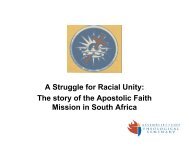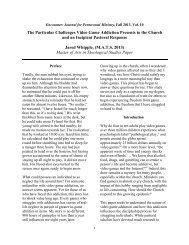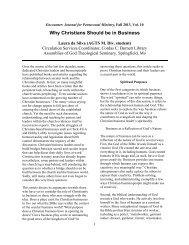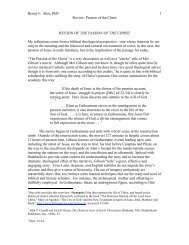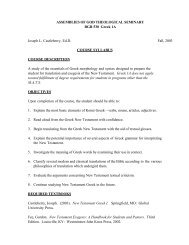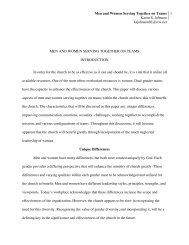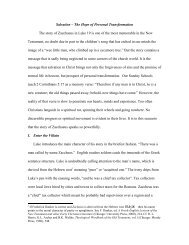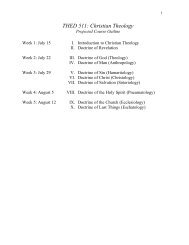Encounter: Journal for Pentecostal Ministry - Assemblies of God ...
Encounter: Journal for Pentecostal Ministry - Assemblies of God ...
Encounter: Journal for Pentecostal Ministry - Assemblies of God ...
Create successful ePaper yourself
Turn your PDF publications into a flip-book with our unique Google optimized e-Paper software.
the community, “this actually happens in<br />
Luke‟s second volume.” 84 Acts <strong>of</strong> the<br />
Apostles provides testimony to the ideas<br />
proclaimed in Luke‟s Gospel and<br />
exemplifies the true nature <strong>of</strong> Christian<br />
benevolence. The Early Church in Acts<br />
maintained a definite ministry to the poor<br />
and was concerned <strong>for</strong> the overall wellbeing<br />
<strong>of</strong> those in need. In fact, they <strong>of</strong>ten<br />
sacrificed their own financial status in order<br />
to aid others.<br />
Church’s Priority <strong>of</strong> Benevolence from<br />
Acts to Modern Times<br />
Throughout history, the Church has<br />
responded to the poor and economically<br />
deprived in various ways. Some <strong>of</strong> the Early<br />
Church Fathers followed the example <strong>of</strong> the<br />
Early Church in Acts through their<br />
economic assistance and concern <strong>for</strong> the<br />
poor. For instance, John Chrysostom<br />
considered almsgiving an act <strong>of</strong> worship and<br />
an expression <strong>of</strong> love commanded by<br />
Christ. 85<br />
In the Protestant tradition, shifts have<br />
occurred relating to care <strong>for</strong> the poor. While<br />
the Protestant Church has based its<br />
theological principles on justification by<br />
faith, the relationship between caring <strong>for</strong><br />
those in need and the Christians‟ spiritual<br />
well-being has created conflict at times,<br />
specifically when attempting to discern<br />
between those genuinely in need <strong>of</strong> help and<br />
others who seek to take advantage <strong>of</strong> an<br />
organization based on love and care. 86 The<br />
Christian lifestyle in its walk <strong>of</strong> faith calls<br />
<strong>for</strong> care toward others and examines the<br />
affect this has on one‟s personal spirituality.<br />
For example, Matthew 25:40 states, “The<br />
King will reply, „I tell you the truth,<br />
whatever you did <strong>for</strong> one <strong>of</strong> the least <strong>of</strong><br />
these brothers <strong>of</strong> mine, you did <strong>for</strong> me.‟”<br />
This concept became difficult to maintain<br />
and understand after the Middle Ages when<br />
13<br />
urbanization in Europe brought about a large<br />
number <strong>of</strong> genuinely impoverished people<br />
due to economic conditions as well as those<br />
who made their way into a system <strong>of</strong><br />
voluntary poverty under false pretenses. 87<br />
There<strong>for</strong>e, questions arose regarding the<br />
distinction between what Casey calls the<br />
“deserving” and “undeserving poor.” 88 This<br />
fact, along with Martin Luther‟s concern <strong>for</strong><br />
a “piety <strong>of</strong> achievement” created a debate<br />
when discussing the length at which the<br />
Church should concern itself with the issue<br />
<strong>of</strong> poverty. 89<br />
Re<strong>for</strong>mation theologians, however, such as<br />
Martin Luther and John Calvin, sought to<br />
affirm good works as the fruit <strong>of</strong><br />
justification by grace through faith in Christ,<br />
not as a cause <strong>of</strong> salvation. 90 Calvin believed<br />
that the Church should properly respond to<br />
poverty by assuming responsibility <strong>for</strong> its<br />
alleviation. 91 Calvin saw an indifference to<br />
the poor on the part <strong>of</strong> the rich as a highly<br />
dangerous error because <strong>of</strong> a unity between<br />
aiding the poor and its spiritual<br />
connection. 92 Matthew 25:44-46 concludes:<br />
They also will answer, „Lord,<br />
when did we see you hungry<br />
or thirsty or a stranger or<br />
needing clothes or sick or in<br />
prison, and did not help you?‟<br />
He will reply, „I tell you the<br />
truth, whatever you did not<br />
do <strong>for</strong> one <strong>of</strong> the least <strong>of</strong><br />
these, you did not do <strong>for</strong> me.‟<br />
Then they will go away to<br />
eternal punishment, but the<br />
righteous to eternal life.<br />
These verses adequately support Calvin‟s<br />
concern <strong>for</strong> the poor and the spiritual<br />
connotations this has on an individual‟s<br />
Christian life. Calvin also saw spiritual<br />
connection between the poor and the<br />
wealthy. 93 Protestant Pietism in the



